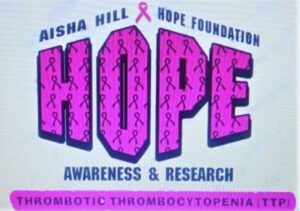
The content presented on our website is for education and informational purposes only in effort to bring an awareness to this life-threatening condition known as Thrombocytopenia. Information has been collected from various sources that has performed numerous studies regarding this condition. It is our hope that we may get the attention of people around the world that is unaware of this rare, but life-threatening condition. We hope to continue in our efforts in being a resource in this awareness.
Thrombocytopenia is a condition that occurs when the platelet count in your blood is too low. Platelets are tiny blood cells that are made in the bone marrow from larger cells. Thrombotic Thrombocytopenic Purpura (TTP) is a rare, life-threatening blood disorder, and is considered a true medical emergency. TTP is diagnosed at a rate of 3-4 in 1 million people per year. Potentially fatal complications can result from internal blood clotting, placing the organs at risk for damage due to a lack of oxygen and nutrients from blood. TTP can be fatal, and without treatment, it can cause long-term problems, such as brain damage or stroke.
For more information on Thrombocytopenia (TTP) click the link from the top menu
Having Hope

Those who hope in the Lord will renew their strength. They will soar on wings like eagles; they will run and not grow weary, they will walk and not be faint. – Isaiah 40:31 (NIV)
The Aisha Hill Hope Fund is a 501(c)3 nonprofit charity established to help people that have emergency financial crisis, and to bring awareness to a life-threatening condition known as Thrombotic Thrombocytopenic Purpura (TTP). We also work to establish various programs within the communities, and contribute to other charities in an effort to help people in need. If you are in need of help you can apply by clicking here or on the apply for help button on the top menu to see if you are eligible to receive assistance or a grant. If you would like to help us help others, please donate by clicking on the donation button on the top menu. God Bless!
What is TTP?
Thrombocytopenic Purpura/Physiolgy
Thrombotic Thrombocytopenic Purpura is a rare blood disorder that is considered a true medical emergency with complications that can result from internal blood clotting, with damage to critical organs such as the brain and heart.
Blood begins to form clots in blood vessels throughout the body, and these clots are made up of platelets, one of the elements in blood. Vital blood flow to the body’s organs is restricted, placing the organs at risk for damage due to a lack of oxygen and nutrients from the blood. Moreover, since platelets are being used to form numerous unnecessary blood clots, their availability to perform their normal function, which is to seal injury sites to prevent excess bleeding, is compromised.
Hereditary TTP
1% of TTP cases are due to an inherited deficiency or abnormality of enzymes.
SYMPTOMS
• fatigue
• fever
• bleeding (from nose, gums)
• diarrhea
• chest pain
• abdominal pain
• neurologic symptoms (confusion, headaches, visual changes)
• thrombocytopenia (bruising, purpura, petechiae)
A medical history and a physical exam, in combination with a complete blood count (CBC), lactate dehydrogenase level (LDH) and blood smear are used to determine a diagnosis of TTP. It’s important after diagnosis to discuss and follow up with treatment immediately.
TREATMENT
Hereditary TTP
Monthly prophylactic plasma is sometimes administered to patients to replenish and maintain adequate levels of functioning ADAMTS 13, the enzyme which the patient is unable to produce themselves. Immune-mediated TTP (iTTP)
Most patients receive steroids, e.g. prednisone, to slow the immune system and therefore the progression of this autoimmune disorder. The side effects of steroids can be challenging.
In all cases of iTTP, plasma exchange is the basic treatment of choice. Plasma exchange involves the use of automated machinery which permits the removal of the patient’s plasma and replacement with donor plasma during a 3 to 4 hour treatment. Plasma exchange both removes antibodies and replenishes normal plasma proteins. To treat iTTP, a series of daily or every other day plasma exchanges is used.
PROGNOSIS
Early detection of such a flare of the disease is critical to minimize the risk of death or irreversible injury to vital organs.
Women considering pregnancy should discuss their individual case with their TTP specialist. Research is showing an ADAMTS 13 assay to be helpful in evaluating the risk of relapse during pregnancy, and in suggesting a risk mitigating prophylaxis treatment.
















